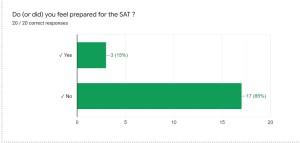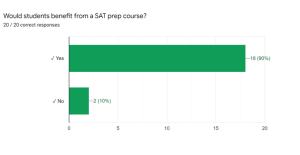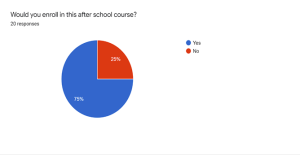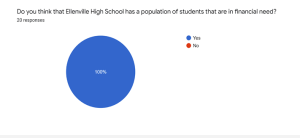Ethan Alexander
Overview
The college admissions process is a remarkably stressful event for high school seniors. Aside from their required coursework, students must also draft essays and obtain letters of recommendation that will have long-lasting impacts on their future. Students are left hoping they are able to attend a respectable college or university. Many college applications also require the submission of a SAT score, placing even more stress on students. As a high school senior this year, I felt that I would have greatly benefited from more guidance during the college admissions process. The Ellenville Central School District does not currently offer programs that help students with admissions, but this SAT prep course is a great place to start. While some students decide to purchase review books or hire tutors, this is not available to all seniors. This issue in preparedness is only exacerbated by a student’s socioeconomic status. With something as important as their future hanging in the balance, students would greatly benefit from having extra review materials. These large standardized tests are inherently confusing and focus on topics and skills that are not thoroughly covered in high school.
The SAT requires test takers to have an expansive grasp of English vocabulary and math concepts that are not in the average high school curriculum. A quick search on Google reveals lists of “must know” vocabulary words and comparisons that are often found on the test. This information is not accessible for our school district’s low income demographic. It is at this point that we see an obvious issue in equity; how is it fair that low income students have to prepare for a test without the same resources that more well-off students have? This grant would provide students with study materials as well as a tutor once a week after school to help prepare them for the SAT.
Assessment of Need
The Ellenville Central School District’s New York State Regents scores demonstrate a desperate need for assistance. According to the New York State Education Department, a large number of students do not demonstrate a mastery understanding in math. A meager 54% of geometry test takers and only 72% of algebra test takers received a “proficient score.” Despite the fact that math problems make up one half of the SAT, Ellenville High School students struggle on high school level exams. This is partially due to the high rate of poverty in our school system. In a 2019 revitalization report prepared for the town of Wawarsing, it was found that, “…the block group in which Ellenville North is located had a poverty rate of 23.3%, according to American Community Survey (ACS) Five-Year Estimates from the U.S. Census Bureau. This is well above the village, town, and county poverty rates.” This issue is even recognized in our own school; in a survey of 20 Ellenville High School juniors and seniors, 100% believed that our school has a population of students in need (Appendix A). With such a high rate of poverty in the community, it is likely that many students do not have access to study materials or a stable home life that promotes education.
The situation in Ellenville is not unique; the New Jersey State Test Results reveal similar issues in different communities. The Advocates for Children of New Jersey broke down the relationship between poverty and standardized test grades by race. In 2013, 56% of African American children were living below 200% of the federal poverty line. Also in 2013, 58% of African American students passed the eleventh-grade math state test. This is contrasted by only 19% of white students living below 200% of the federal poverty line in 2013. In 2013, 87% of white students passed the New Jersey State math test. Even when students attempt to study independently, an unstable home life and possible work obligations make this incredibly difficult. It is obvious that our students need help, but currently, there is very little available information for those that cannot afford expensive tutors.
Project Goals
This $5,000 grant would help to alleviate the educational struggles that our low-income students at Ellenville High School face. An astounding 85% of Ellenville High School students stated that they felt unprepared for the SAT (Appendix A). This course would help to increase SAT scores across the board by giving them meaningful assistance. The program will monitor the students’ progress throughout the course by comparing grades of the various practice tests supplied by the review program.
The course would take place one evening per week for six weeks leading up to the first SAT in October. It would have to run for two hours from five to seven in the evening to avoid conflict with the various sports seasons and clubs that are active in the fall. In order to reduce cost, students must be able to provide their own transportation to and from the school. For three of the six weeks, a teacher that specializes in math would be available during this time. An English teacher would also be available for the other three weeks of this program. Students would receive a self-paced SAT prep account through the Princeton Review that provides practice tests, questions, and video lessons. This would be connected to the student’s school Google account, so it could work with the school-issued Chromebook. This would also enable the students to have access to the review materials outside of this two hour workshop for additional practice and studying. In addition, this grant would cover the fifty-two dollar cost of applying for the test.
In order to qualify for this grant, students must demonstrate a financial inability to access review materials. Due to the constraints of the budget, only fifteen students will be able to attend this review session. The largest hurdle this program would face is actually attendance. Tanya Allen, a guidance counselor at Ellenville High School notes, “I’m concerned that the… intended targets may not be your most active participants” (Appendix B). The program must provide incentives aside from academic achievement to encourage student participation. This program will provide snacks for students to enjoy during their studying and students will be financially compensated if they work after school. Given that 27.7% of households in the north Ellenville area make less than $15,000 per year, it is likely that students will be working after school to support their family (Skeo Solutions). The applicant must provide proof that they were scheduled to work during these classes from five to seven in the evening. Students will be compensated at the New York State minimum wage of $12.50 per hour (New York State’s Minimum Wage). Students that do not work after school can also utilize the program without the financial compensation aspect. Considering that this program offers the students so much, there is one stipulation in the agreement. Students must take the SAT that they were scheduled to complete. Failure to take the test will result in a personal refund to the school for the Princeton Review and SAT application costs.
Budget and Finances
Each part of this budget was meticulously researched and balanced so that the maximum number of students could benefit from the program. We first need to look at compensating teachers for helping students during this program. According to the Ellenville Teachers Union contract, teachers are paid $43 per hour for Regents review classes. Since these will be structured in a similar manner, this program would compensate teachers at the same rate. There will be a total of twelve hours of instruction, taking away $516 of the budget to pay the English and math teachers for their time. Next is the cost of the review materials. While many websites offer their version of an SAT prep course, many of them come from unestablished sources. This program will utilize the Princeton Review SAT Self-Paced Exclusive online course. According to the Princeton Review website, the course offers seventeen practice SATs, practice test review sessions, and a one year access to the course at $199 per student. Rounding this cost to $200, this is the largest expense of the program. $3,000 of the budget will pay for this course for fifteen students. The proposed program will also cover the cost of the SAT application for its students. The test costs $52 per application, with fifteen applicants, this detracts an additional $780 from the $5,000 budget.
This program also dedicates part of its budget to student incentives such as food and reimbursing wages lost from taking these classes instead of working. The program will set aside $500 of its budget to reimburse the students who attended the classes instead of working. They will be repaid at the hourly rate of $12.50. This would not cover the cost if every student is missing work for every class, but it would work on a first-come first serve basis. Students that submit their proof of employment first will receive the compensation until it runs out. The remaining $204 dollars will then be used to pay for food and snacks for the students during the after school study periods. These incentives will help to increase student turnout; in a house that does not value education, many students may not understand the true value that this program will provide them.
Closing Statement
In summary, an after school SAT prep class would greatly help the low-income students of Ellenville High School. Our community clearly demonstrates need; these resources are unavailable to our students due to economic hardships. A $5,000 grant could drastically improve the chances our students have of attending a university and receiving better scholarship opportunities. A high school education is a great foundation for young adults, but a college education opens the door to endless opportunity.
Appendix A
- Do (or did) you feel prepared for the SAT ?
- Would students benefit from a SAT prep course?
- Would you enroll in this after school course?
- Do you think that Ellenville High School has a population of students that are in financial need?




Works Cited
Advocates for Children of New Jersey. “New Jersey Kids Count 2015: A Statewide Profile of Child Well-Being.” Advocates for Children of New Jersey, Advocates for Children of New Jersey, 1 Jan. 2015. EBSCOhost, search.ebscohost.com/login.aspx?direct=true&db=eric&AN=ED585532&site=ehost-live.
Alexander, Ethan. “SAT Test Prep Proposal.” Survey. 29 April 2021.
Allen, Tanya. Personal Interview. 05 May 2021
“Ellenville CSD: NYSED Data Site.” Data.nysed.gov, data.nysed.gov/profile.php?instid=800000036084.
“New York State’s Minimum Wage.” Welcome to the State of New York, 31 Dec. 2020, www.ny.gov/new-york-states-minimum-wage/new-york-states-minimum-wage.
The Princeton Review. (2021). SAT & ACT Prep Courses. Retrieved from www.princetonreview.com/college/sat-selfguided-course?ceid=tersh-nav-essentials-course.
Skeo Solutions. “Revitalization Opportunities Report for the Ellenville North Study Area.” Ulster County NY, New York State Department of State Brownfield Opportunity Area Program., ulstercountyny.gov/sites/default/files/documents/planning/ellenville_north.pdf.
